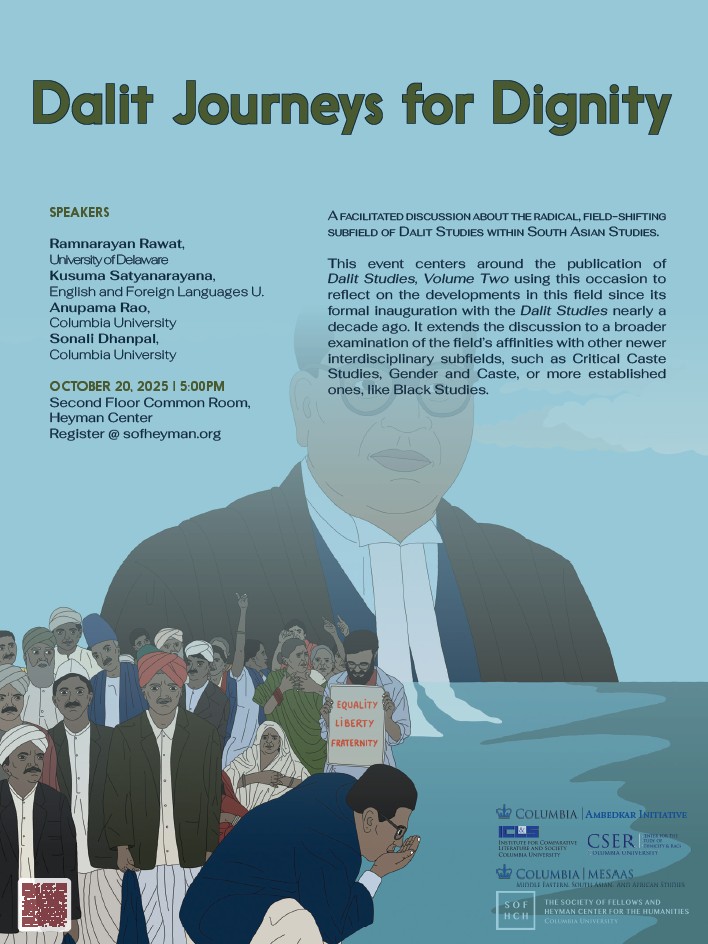
Heyman Center
Society of Fellows and Heyman Center for the Humanities (SOF/Heyman)
Institute for Comparative Literature and Society (ICLS), Middle Eastern, South Asian, and African Studies (MESAAS), and Ambedkar Initiative
Dalit Journeys for Dignity is a facilitated discussion about the radical, field-shifting subfield of Dalit Studies within South Asian Studies. This event centers around the publication of this second volume, the Dalit Studies Volume Two (April 2025, SUNY Press and Permanent Black), using this occasion to reflect on the developments in this field since its formal inauguration with the Dalit Studies (Duke, 2016) by Ramnarayan S. Rawat (Delaware) and Kusuma Satyanarayana (EFL-U, Hyderabad) now close to a decade ago. It extends the discussion to a broader examination of the field’s affinities with other newer interdisciplinary subfields, such as Critical Caste Studies, Gender and Caste, or more established ones, like Black Studies.
Invitees:
Ramnarayan Rawat, Associate Professor, University of Delaware.
Is a historian of South Asia with particular interests in colonial and postcolonial India, racism and social exclusion, subaltern histories, and histories of democracy. His research focuses on Dalits (‘untouchables’) of India and their engagement with colonialism, nationalism, spatial and social exclusionary regimes, and democratic thought and practice in modern India. Recent publications include a co-edited book, Dalit Studies, with K. Satyanarayana based in Hyderabad (India), Duke University Press, 2016, and an ongoing second book, ‘The Dalit Public Sphere: A Subaltern History of Liberalism and Democratic Practices’, which explores the role of Dalit groups in introducing innovative ideas and practices in the history of liberal thought. His first book, Reconsidering Untouchability: Chamars and Dalit History in North India (Ranikhet: Permanent Black, 2012 & Bloomington: Indiana University Press, 2011) was the recipient of the Joseph Elder book prize awarded by the American Institute of Indian Studies (2009) and received ‘Honorable Mention’ in the 2013 Association of Asian Studies Bernard S. Cohn book prize. Building
Kusuma Satyanarayana is an Associate Professor and the Head of the Department of Cultural Studies at English and Foreign Languages University (EFL-U) in Hyderabad.
Dr. Satyanarayana is involved in teaching and research in the new field of Dalit Studies. He has presented papers at the national and international levels and has published in the areas of Dalit studies, literary history, Indian writing English, and Critical Theory. He has co-edited the forthcoming book with Susie Tharu, No Alphabet in Sight: A Dossier of Dalit Writings from Tamil Nadu and Kerala. Volume 1, Penguin India.
Anupama Rao, Professor of History and MESAAS, Columbia University.
With research and teaching interests in gender and sexuality studies, caste and race, historical anthropology, social theory, comparative urbanism, and colonial genealogies of human rights and humanitarianism, Rao has written widely on the themes of colonialism and humanitarianism, and non-Western histories of gender and sexuality. Her book, The Caste Question (University of California Press, 2009), theorized caste subalternity, with a specific focus on the role of anti-caste thought (and its thinkers) in producing alternative genealogies of political subject-formation. She is the Principal Investigator for the Global Humanities Institute-CHCI (Mellon) grant, “Global Racisms, Cold War Humanism, and Just Futures,” (2022-2024); she co-directs the project, “Geographies of Injustice,” hosted by Columbia’s Center for the Study of Social Difference. She is the Director, Institute for Comparative Literature and Society and the convenor of the Ambedkar Initiative, which is supported by the Provost’s Office (Barnard), the Deans of Humanities and Social Sciences (Columbia), the Office of the EVP (Columbia), Columbia University Press, and the Columbia Libraries. She served as Senior Editor, Comparative Studies in South Asia, Africa, and the Middle East from 2012 to 2021.
Sonali Dhanpal is the 2024-26 Buell Research and Teaching Fellow at Columbia University.
She is a historian of modern architecture and urbanism who specializes in histories of colonialism, capitalism, and inequality. Her research on late colonial South Asia and post-colonial Britain examines the relationship between architecture and racial hierarchies that explain race, caste, and class-based unfreedoms within broader struggles for space under racial capitalism. Her first book, Caste, and the City analyses Bangalore’s emergence out of a boundary between colonial and princely rule to unravel the inextricable relationship between caste, the political economy of land/property, and the city. Dhanpal’s new research critically situates Britain’s post-war architect-planner-led construction boom and subsequent decline (1950-1980) as an afterlife of empire through a social and intellectual history of race and housing. Her scholarly work has been supported by the Royal Historical Society and Institute of Historical Research, School of Advanced Studies, University of London, the Paul Mellon Centre for British Art, the Society of Architectural Historians, and the Society of Architectural Historians Great Britain. She received her PhD in Architectural History and Theory in 2023 from SAPL, Newcastle University, as the inaugural Forshaw Scholar and was the 2023-2024 Princeton-Mellon Fellow in Architecture, Urbanism, and the Humanities at Princeton University.







